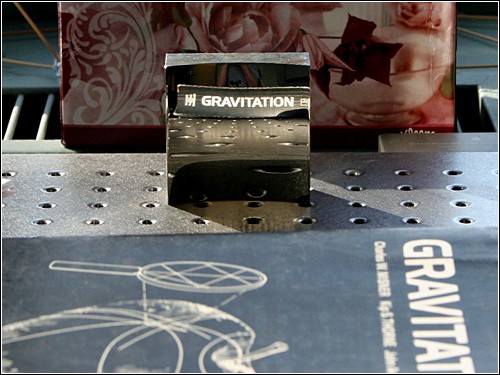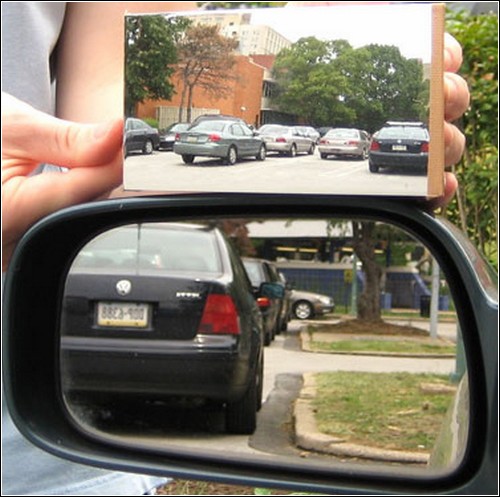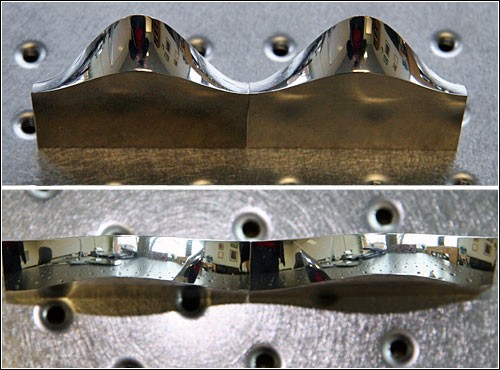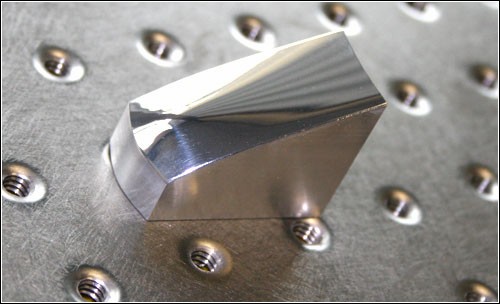The new generation of mirrors from Andrew Hicks
Mathematician Andrew Hicks develops curved mirrors that reflect without distortion. How can this be? Not so easy. Each of the six types of mirrors that Hicks has developed has a complex surface, which ... However, it’s better about each type in order.
It all started with the fact that Hicks's friend - Ron Perlin complained that the rear-view mirror on his bike gives a strong distortion. Hicks decided to invent such a mirror so that it was convex, but at the same time did not lead to distortions and at the same time gave the rider a greater overview than traditional mirrors. It took eight years to translate the idea. The result is this:
Mirror with direct reflection

')
In this mirror, the text does not turn over, so through it you can, for example, easily read. This is achieved at the expense of a complex surface: at first a ray of light itself is mirrored and only then returns to the observer.
Rear-view mirror with a 2.5-fold increased viewing angle

A normal rearview mirror has a viewing angle of about 17 degrees. Hicks mirror increases this value up to 45 degrees. As a result, there are no dead zones.
Panoramic view mirror

In any convex surface, the panorama is noticeably distorted, but not in the mirror of Hicks. The parabolic mirror developed by him gives an accurate panoramic reflection. The size of the reflected objects does not depend on the curvature of the surface of the mirror, but only on the distance to them.
Sustained Perspective Mirror

In fact, it is a round mirror in which straight lines are reflected. This is so far the only Hicks development that has found practical application. The mirror was designed for use in the camera of a robot that can climb stairs. The coverage area of a camera that “looks” into such a mirror increases significantly, which means that the sensors of the robot receive more information. Accordingly, it becomes more difficult to fall from the steps.
Infrared mirror

This "glass" reflects only infrared light and is designed for infrared image processing systems. The reflected infrared rays can be judged on the temperature of the object.
Cylindrical mirror

What exactly is reflected in this mirror can be determined only if you look at it from a certain point.
Via newscientist.com
It all started with the fact that Hicks's friend - Ron Perlin complained that the rear-view mirror on his bike gives a strong distortion. Hicks decided to invent such a mirror so that it was convex, but at the same time did not lead to distortions and at the same time gave the rider a greater overview than traditional mirrors. It took eight years to translate the idea. The result is this:
Mirror with direct reflection

')
In this mirror, the text does not turn over, so through it you can, for example, easily read. This is achieved at the expense of a complex surface: at first a ray of light itself is mirrored and only then returns to the observer.
Rear-view mirror with a 2.5-fold increased viewing angle

A normal rearview mirror has a viewing angle of about 17 degrees. Hicks mirror increases this value up to 45 degrees. As a result, there are no dead zones.
Panoramic view mirror

In any convex surface, the panorama is noticeably distorted, but not in the mirror of Hicks. The parabolic mirror developed by him gives an accurate panoramic reflection. The size of the reflected objects does not depend on the curvature of the surface of the mirror, but only on the distance to them.
Sustained Perspective Mirror

In fact, it is a round mirror in which straight lines are reflected. This is so far the only Hicks development that has found practical application. The mirror was designed for use in the camera of a robot that can climb stairs. The coverage area of a camera that “looks” into such a mirror increases significantly, which means that the sensors of the robot receive more information. Accordingly, it becomes more difficult to fall from the steps.
Infrared mirror

This "glass" reflects only infrared light and is designed for infrared image processing systems. The reflected infrared rays can be judged on the temperature of the object.
Cylindrical mirror

What exactly is reflected in this mirror can be determined only if you look at it from a certain point.
Via newscientist.com
Source: https://habr.com/ru/post/52997/
All Articles